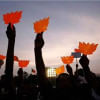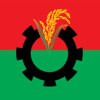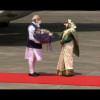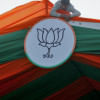Nepal's economy in chokehold
It has become difficult to follow Indian Prime Minister Narendra Modi's style of diplomacy. He is seen as a darling to the West, primarily because India promises a big market for them. Nearer at home, he has shown two different faces. With India's arch rival Pakistan, Modi seems to have suddenly chosen Pakistani PM Nawaz Sharif as his "buddy". But with Nepal, Modi has turned out to be Kathmandu's bête noire.
It has been nearly four months since the unofficial economic blockade imposed by India on Nepal began. Relations between the Himalayan republic and its southern neighbour have been steadily deteriorating since the promulgation of Nepal's new Constitution in September 2015. Delhi was unhappy as the new charter has apparently discriminated against the Madhesi people living in the Terai region and had asked Nepal to amend the Constitution to ensure more rights for the Madhesis.
The agitating United Democratic Madhesi Front (UDMF), which represents the Madhesis, blocked all the road entry points from India to Nepal. This has created a serious shortage of all essentials, particularly petroleum products.
Though Delhi has denied any part in this blockade, people firmly believe that India has instigated the Madhesis to create road blocks. Leaders of main political parties and the media in Nepal oppose any change to the Constitution. The new communist Prime Minister Khadga Prasad Sharma Oli (63), known to be a nationalist, also does not seem to favour any change to the Constitution.
On December 31, 2015, Oli called Modi over telephone to exchange New Year greetings. Oli briefed Modi on the political developments in Nepal and the Indian PM suggested that Nepal should find a durable solution to the political problems through consensus or sahmati. Oli informed his Indian counterpart that he was "not anti-India" and was willing to resolve the constitutional problems as he wanted to strengthen ties with India. Modi's statement that there was "no blockade" shows that India refuses to recognise that it has imposed obstructions.
Earlier, Nepali Deputy Prime Minister Kamal Thapa was in Delhi on December 1, 2015 when he presented a four-point road-map aimed at resolving the Madhesi crisis, which was supported by Delhi. At a recent meeting Prime Minister Oli expressed his displeasure that despite an understanding, India has not reopened customs at Nepal-India border points and described the blockade as "inhuman and beyond imagination".
The blockade has actually choked Nepal's economic life. Nepal's Finance Minister Bishnu Paudel issued a White Paper on November 24, 2015, describing the current economic situation of Nepal created by the undeclared blockade. The minister painted a bleak picture, saying that the nation's economy will only grow by 2 percent as opposed to the earlier estimate of 6 percent because of the blocakde. The reason for this slowdown, he explained, is the shrinking of economic activities with the obstruction on supply caused by the blockade.
Paudel pointed out that only 4.1 percent of the capital budget allocation of (Nepali) Rs. 74 billion could be spent during the first three months of the current fiscal year (July 2015 – July 2016). The service sector – hotels, tourism, transportation etc, which grew at 6.1 percent last year - has been destroyed due to acute shortage of fuel and will not exceed 3 percent growth this year.
The lack of cooking gas has hit the population severely. People have turned to cutting trees for firewood. And with winter setting in, the forests are fast disappearing, leading to an ecological catastrophe. The fuel blockage has been described as worse than the earthquake and has become a humanitarian crisis.
Inflation has risen from 6.9 percent (July, 2015) to 8.3 percent (September, 2015) with the food sector being badly hit. Imports have declined to Rs 130 billion (July-September 2015) compared to Rs 191 billion of the corresponding period of the last fiscal year. Exports dropped from Rs 22.53 billion to Rs 16.81 billion in the same period. The debt burden has risen to Rs 539 billion, which is 24.5 percent of Nepal's GDP.
Agricultural production will go down by 10 percent, with a risk of food insecurity. Around 2,200 industries have shutdown, with more than 200,000 employees rendered jobless. Demurrage piling up on stranded trucks and containers in Kolkata have surged to Rs 5 billion.
The land-locked country had suffered massive earthquake in April 2015, in which 9,000 people died and 700,000 were made homeless. Due to the agitation and blockade, the government has not been able to start the reconstruction work, though $4.1 billion has already been sent in from international donors. UN Secretary General Ban-ki Moon has urged India to lift the blockade and allow the Nepali government to engage in reconstruction efforts.
The grim economic situation has driven Nepal to seek assistance from its northern neighbour. China has already supplied 1.3 million litres of petroleum products in October and sent essential commodities to the country. Nepal has also received another consignment of fuel worth 10 million RMB in December 2015. There are reports that Prime Minister Oli will be visiting China in March 2016, before going to Delhi. Sources close to the Prime Minister say that Oli will go to Delhi after India has lifted the blockade.
Narendra Modi visited Nepal in August 2014 and pledged $1 billion for Nepal's reconstruction work as part of his "neighbourhood diplomacy". But Delhi's undeclared support and instigation for the Madhesis has cost it its goodwill and has unnecessarily earned the distrust of Nepal's traditional elites, who rule the country.
Recent reports indicate that Prime Minister Oli is considering amending the Constitution to accommodate India's concerns. Even if the current confrontation is resolved, it will take a long time before Indo-Nepal relations are healed. Delhi needs to step back and respect Nepal's sovereignty. By choking the Nepalese economy, Modi is creating instability in South Asia.
The writer is a former ambassador and secretary.

 For all latest news, follow The Daily Star's Google News channel.
For all latest news, follow The Daily Star's Google News channel. 








Comments